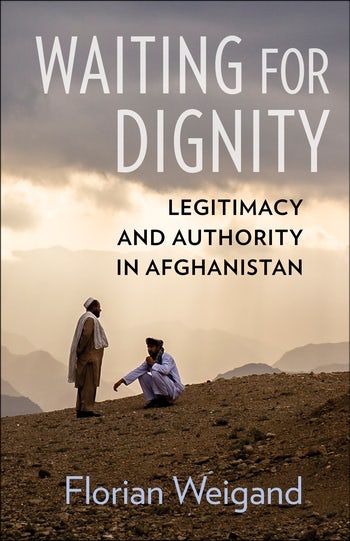Waiting for Dignity: Legitimacy and Authority in Afghanistan, Columbia University Press, 2022
Order here and get 20% off with the discount code “CUP20”
In August 2021, Taliban fighters entered the presidential palace in Kabul, ending twenty years of international efforts to build a democratic state in Afghanistan. Did the Taliban’s success rest on coercion and violence alone, or did they win the battle for public support through ideology and better services? Or did most people in the country not believe in the idea of the state at all, trusting only local elders and traditional councils? What is the source of legitimacy during armed conflict?
In Waiting for Dignity, Florian Weigand investigates legitimacy and its absence in Afghanistan. Drawing on hundreds of interviews, he examines the perspectives of ordinary people in Afghanistan as well as those of rival claimants to authority: insurgents, warlords, members of parliament, security forces, and community leaders. By exploring how different types of authority attempted to legitimize their rule, Waiting for Dignity challenges common assumptions about how to build legitimacy, such as by delivering services, holding elections, or adopting traditional institutions. Weigand shows that what matters in conflict zones is dignity: People judge authorities on the basis of their day-to-day experiences with them. The extent to which people perceive interactions to be fair, inclusive, and respectful is vital to the construction of lasting order. Combining theoretical originality with in-depth and compelling empirical detail, this book offers timely new insights into recent developments in Afghanistan and the challenges facing conflict-torn areas more widely.
“Weigand’s terrific book on how authority has been built and lost in Afghanistan is also an invitation to return to deeper levels of analysis. It runs from rethinking what legitimacy means in today’s world to what we have lost in the last twenty or more years. His conclusions have wide relevance beyond Afghanistan, shedding light on conditions that affect both the powerful and the poor and often forgotten.”
– Saskia Sassen, Columbia University
“Numberless personal stories from countries under foreign occupation or despotic rule tell how it is an incident of personal humiliation that triggers an individual’s decision to defy authority. In Waiting for Dignity, Florian Weigand validates this insight with the best kind of social science, giving a voice to Afghans and making sense of what they have to say. Rather than testing a received hypothesis he has generated a fresh new understanding of political legitimacy–that fundamental but elusive concept.”
– Alex de Waal, author of The Real Politics of the Horn of Africa: Money, War and the Business of Power
“This book is an important read about the failure of building a legitimate state in post-2001 military intervention in Afghanistan, and why the Afghan Republic and its allies lost the battle for public support. The book’s key argument around perception of legitimacy for various stakeholders in different communities is informative and valuable to understand governance and violence in Afghanistan.”
– Timor Sharan, author of Inside Afghanistan: Political Networks, Informal Order, and State Disruption
“This pathbreaking book joins a new generation of scholars who are rethinking the Weberian foundations of the modern state. Based on extensive field work, Weigand looks at Afghanistan from the bottom up. By doing so, the book introduces us to a panoply of organizations and actors that shape legitimate governance in Afghanistan.”
– Jennifer Brick Murtazashvili, author of Informal Order and the State in Afghanistan
“A well-argued and compellingly evidenced account of how legitimacy works in Afghanistan, this book challenges the rational legal perspectives that dominate policy and theory on this issue. Written in a fluid style, Waiting for Dignity is rich in empirical material and offers a useful comparative perspective that will appeal to policymakers as well as the academic public.”
– Ashley Jackson, author of Negotiating Survival: Civilian-Insurgent Relations in Afghanistan
“This is a highly valuable contribution, whether your main interest is in legitimacy in contexts of conflict generally, or in legitimacy and authority in Afghanistan specifically.”
– Kristian Berg Harpviken, Journal of Peace Research
“This book is a rich and layered examination of what a legitimate authority might mean to the people of Afghanistan.“
– Kanak Rajadhyaksha, South Asia: Journal of South Asian Studies
